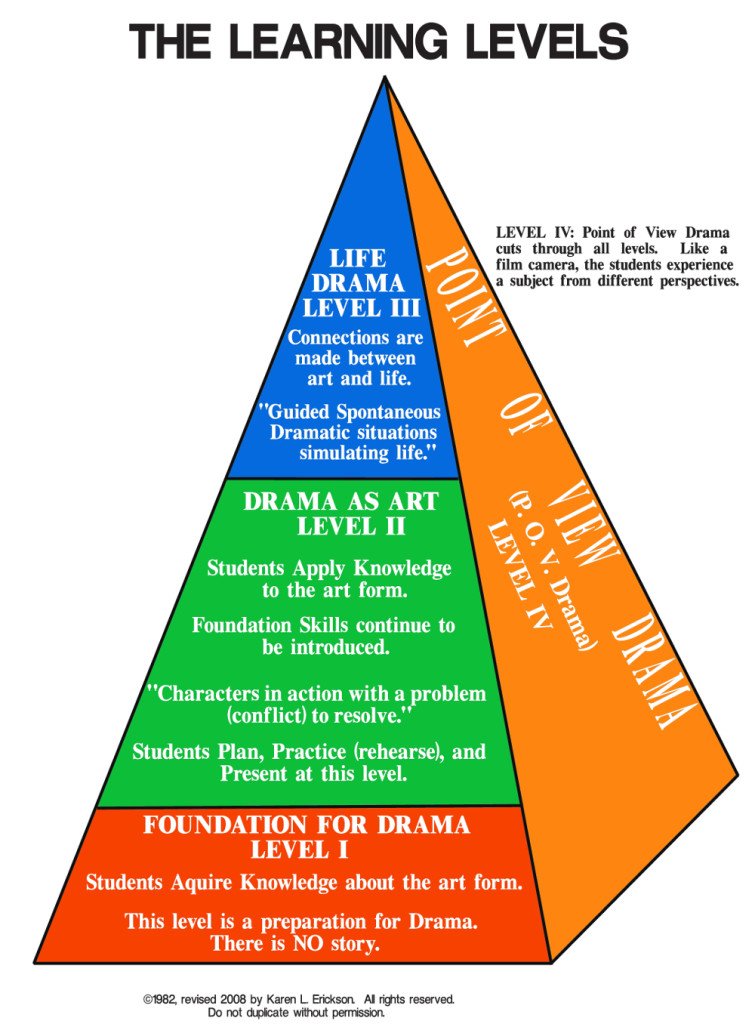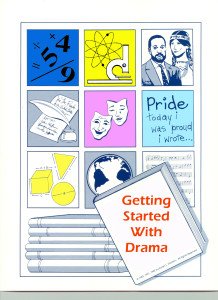
The Erickson Drama/Learning Program is organized by four distinct and progressive levels and a Five Word Focus. These Five Words cover the five beginning skills in drama: concentration, imagination, transformation, imitation, and collaboration.
Each successive level builds upon the previous becoming more complex and enriching. All of the levels can occur yearly from 3 year olds through university study. Advanced drama leaders can jump to any level they desire based on their participants’ or actors’ background. It is recommended that beginning leaders work their way through each level.
Here are the four Drama Learning Levels:
Level I: FOUNDATION ACTIVITIES – These are quick activities that introduce a skill or concept needed to do dramatic work. These are “pre-drama” activities. We converted some activities to lesson plan form and they can be found typically with the same name. Once you become familiar, you will find most can be taught from the activity description using the “Tips, Hints and Strategies” section. These are referenced as Activities and can be found using the Search bar or "Browse" menu above.
Level II: STORY DRAMA – These are stories, which may or may not include corresponding lessons or units, that have students planning and practicing written, devised, scripted, or improvised stories. Individual Stories can be found using the Search bar or "Browse" menu above.
Level III: LIFE DRAMA – These are lessons or units that have participants engaged in stories that are NOT planned or practiced but, rather, mirror real life “story” as it unfolds.
Level IV: POINT OF VIEW DRAMA – These lessons and units use a combination of Levels I, II, and III and a variety of improvisational strategies to allow students to experience a theme, idea, concept, or philosophy from different perspectives.
The Leader's role in the Drama Learning Levels
- Level I: The teacher directs the activities. Students provide input but only at the direction of the teacher. The teacher acts as guide and rarely participates in the activities. The teacher side coaches, models, encourages, directs, begins, and ends the activities.
 Level II: The teacher often might conduct a Level I activity to introduce a skill or concept. This would be conducted as described above. The primary function of the teacher at this level, however, is to bring in or suggest material in which students can apply what they have learned to an enacted story. Students are free to make changes in the material. Students are given more and more control and choice over their work.
Level II: The teacher often might conduct a Level I activity to introduce a skill or concept. This would be conducted as described above. The primary function of the teacher at this level, however, is to bring in or suggest material in which students can apply what they have learned to an enacted story. Students are free to make changes in the material. Students are given more and more control and choice over their work.
- Level III: The teacher becomes an active participant with the students. The teacher guides the students from within the drama, acting like a playwright and/or director as well as an actor. The students are also guiding the drama. The teacher does not know all of the twists and turns the lesson will take because this is a group project with the teacher as one member of the group. The teacher often learns along with the students.
- Level IV: The teacher moves between all levels. With indications and cues the students begin to combine all levels in order to fully explore an idea, theme, or subject from different perspectives.
You can download the Teacher's Role in the Learning Levels for reference.



